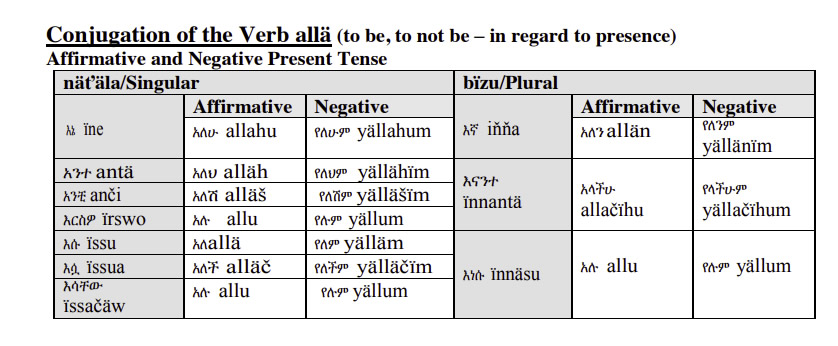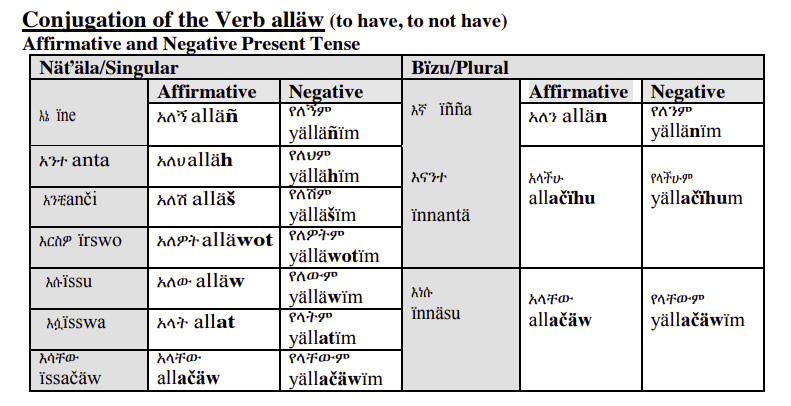Language/Amharic/Grammar/“to-be”-and-“to-have”
Verb "to Be" in regard to presence: አለ allä[edit | edit source]
The verb "to be" in regard to presence is expressed in Amharic by the verb አለ allä. It is used to indicate the existence or presence of someone or something. Here's how to conjugate the verb:
For example:
- ዳንኤል አለ? Daniel allä? Is Daniel here?
- ራሄል አለች? Rachel alläč? Is Rachel here?
- ተማሪዎች ክፍል ውስጥ አሉ tämariwoč kïfïl wïst’ allu. Students are in the class.
- አባቴ ቤት ውስጥ አሉ abbate bet wïst’ allu. My father is at home (polite).
Conjugation table To Be[edit | edit source]
Notice that the verb አለ allä is irregular in the negative form, since it does not use the usual “al-” prefix. This verb has a different form of negative because the negative marker prefix “al-” and the verb aallä itself happen to be identical. So, we add “የ yä- ” at the beginning (and the usual “-ም-m” at the end). (This is not the possessive “yä-” marker!) Expressing “to have” makes use of the verb አለ allä. To say, “I have it”, in Amharic, you must literally say, “It is to me.” To say, “I do not have it,” you must literally say, “It is not to me.”
Examples[edit | edit source]
Look at the following examples:
- አባት አለኝ Abbat alläň. I have a father. (Lit: A father is to me.)
- ወንድም የለኝም Wändïm yälläňïm. I have no brother. (Lit: A brother is not to me.)
As you can see, to express the phrase “to me”, “to you”, etc., a set of affixes called the object pronouns are employed. These will be studied in detail in Units 10 and 12; however they are identical to the endings for the verb “to be” (ነኝ näñ, ነህ näh, etc.) that you met in Unit 2.
The Verb "to have": alläw[edit | edit source]
The verb "to have" is expressed in Amharic by the verb alläw. It is used to indicate possession or ownership of something. Here's how to conjugate the verb:
Examples[edit | edit source]
Examples:
- እህት አለኝ їhït alläñ. I have a sister.
- ጓደኛ አለህ? gwadäña alläh? Do you (m.) have a friend?
When the thing that you own is plural, you must use the ïnnässu forms xlu allu and የሉምyällum, since you are literally saying, “They are to me,” and “They are not to me.”
- ሁለት ድመቶች አሉኝ hulät dïmmätoč alluň. I have two cats.
- ብዙ ጓደኞች አሉሽ bïzu gwadäñoč alluš! You (f.) have many friends!
- ሶስት ልጆች አሏቸው sost lïjjoč alluačäw. They have three children.
- ልጆች የሉኝም lïjoč yällunïm. We don’t have children.
Source[edit | edit source]
- https://en.wikipedia.org/wiki/Amharic
- https://www.livelingua.com/peace-corps/Amharic/Amharic%20Peace%20Corps%20Language%20Manual-2015.pdf
Other Lessons[edit | edit source]
- Questions
- Indirect Object Pronouns
- Adjectives
- Conjugation of the verb መኖር “to live” (present tense)
- Time Adverbs
- The Present Perfect Tense
- Comparing and Contrasting
- Conjugation of mäwdäd (to like) present tense
- Negative Present Future Tense



